
ANNALS OF HEMATOLOGY
Scope & Guideline
Pioneering insights in the ever-evolving field of hematology.
Introduction
Aims and Scopes
- Clinical Management of Hematological Disorders:
The journal frequently publishes studies focused on the clinical management of various hematological conditions, including leukemia, lymphoma, myeloma, and bleeding disorders. This includes clinical trials, treatment strategies, and guidelines for managing complex cases. - Molecular and Genetic Insights:
Research articles often delve into the molecular and genetic underpinnings of hematological diseases, exploring mutations, epigenetic changes, and their implications for diagnosis and treatment. - Innovative Therapies and Treatment Regimens:
The journal showcases developments in novel therapies, including targeted therapies, immunotherapies, and combination treatments, as well as real-world efficacy studies that inform clinical practice. - Transplantation and Cellular Therapies:
There is a significant focus on the role of hematopoietic stem cell transplantation, including conditioning regimens, donor selection, and post-transplant complications, highlighting advancements in transplantation techniques. - Biomarkers and Prognostic Indicators:
The identification and validation of biomarkers for disease prognosis, treatment response, and minimal residual disease monitoring are core areas of interest, reflecting the journal's commitment to precision medicine.
Trending and Emerging
- Immunotherapy and CAR-T Cell Therapies:
Recent publications highlight a significant increase in research focused on immunotherapies, particularly CAR-T cell therapies, reflecting their growing role in treating hematological malignancies. - Real-World Evidence Studies:
There is a surge in studies that analyze real-world treatment outcomes, providing insights into the effectiveness and safety of therapies in diverse patient populations outside of clinical trials. - Management of COVID-19 in Hematology Patients:
The impact of COVID-19 on hematology patients has led to an increase in research exploring treatment modifications, infection management, and vaccine responses in this vulnerable population. - Genetic and Genomic Profiling:
Emerging themes in genetic and genomic profiling are prevalent, with a focus on how these technologies can inform prognosis and treatment strategies for various hematological disorders. - Patient-Centric Approaches and Quality of Life Assessments:
There is a growing emphasis on research that addresses patient-reported outcomes and quality of life, recognizing the importance of holistic care in managing hematological diseases.
Declining or Waning
- Traditional Chemotherapy Approaches:
There is a noticeable decrease in studies focusing solely on traditional chemotherapy regimens, as the emphasis shifts towards targeted therapies and immunotherapies. This trend indicates a growing preference for personalized treatment strategies. - Epidemiological Studies:
The frequency of purely epidemiological studies has declined, possibly due to a shift towards more translational and clinical research that directly impacts treatment and management outcomes. - Single-Center Retrospective Studies:
While still valuable, the number of single-center retrospective studies has waned as there is a movement towards larger, multicenter trials that provide more robust data and generalizability of findings. - Basic Science Research:
There has been a reduction in the publication of basic science studies that do not directly relate to clinical applications, as the journal increasingly prioritizes research with immediate clinical relevance.
Similar Journals
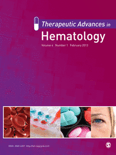
Therapeutic Advances in Hematology
Empowering hematology professionals with cutting-edge findings.Therapeutic Advances in Hematology is a prestigious, peer-reviewed journal dedicated to advancing the field of hematology through innovative research and clinical studies. Published by SAGE Publications Ltd, this journal has become a vital resource for hematology professionals and researchers since its inception in 2010. With its impactful Q1 ranking in Hematology and a Scopus rank of 62 out of 137, it firmly establishes itself as a leader in disseminating significant findings and therapeutic approaches. The journal has been committed to open access since 2019, ensuring that its cutting-edge research is readily available to the global scientific community. Covering a broad scope of topics within hematology, Therapeutic Advances in Hematology is an essential platform for those seeking to enhance their understanding and implementation of therapeutic practices in hematological conditions. The journal embraces submissions from both clinical and laboratory perspectives, fostering collaboration and dialogue among researchers, clinicians, and students alike.

UHOD-Uluslararasi Hematoloji-Onkoloji Dergisi
Empowering researchers with pivotal findings.UHOD-Uluslararasi Hematoloji-Onkoloji Dergisi, published by AKAD DOKTORLAR YAYINEVI, is a pivotal journal in the fields of hematology and oncology, catering to an international audience of researchers, clinicians, and students. Since its inception in 2005, the journal has committed to disseminating high-quality, peer-reviewed research, highlighting advancements and challenges in the diagnosis and treatment of hematological and oncological disorders. Registered under ISSN 1306-133X, it serves as a significant platform for scholarly discourse, despite its recent categorization in the Q4 quartile for both hematology and oncology—indicating opportunities for growth and contribution within the scientific community. While currently not Open Access, the journal's indexed contribution to Scopus ranks it within the 12th and 17th percentiles in the domains of hematology and oncology respectively, reflecting its emerging presence within the academic landscape. As it approaches its convergence point in 2024, UHOD strives to elevate its influence, providing invaluable insights and fostering collaborations in the ongoing fight against blood disorders and cancer.

Mediterranean Journal of Hematology and Infectious Diseases
Connecting scholars to elevate hematology and infectious disease studies.Mediterranean Journal of Hematology and Infectious Diseases is a distinguished open access journal published by MATTIOLI 1885, dedicated to advancing the field of hematology and infectious diseases. Since its inception in 2009, the journal has provided a platform for researchers and practitioners to disseminate innovative findings, foster scholarly discourse, and enhance our understanding of these critical medical disciplines. With an impact factor reflecting its scholarly influence, it is recognized in the Q3 quartile for both Hematology and Infectious Diseases categories as of 2023. The journal's commitment to open access ensures that high-quality research is accessible to a global audience, contributing to the improvement of clinical practices and public health. Located in Fidenza, Italy, the journal continues to support converged research efforts from 2010 to 2024, making it an essential resource for academics, clinicians, and students in the medical community.
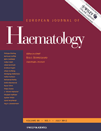
EUROPEAN JOURNAL OF HAEMATOLOGY
Bridging Science and Practice in Blood Disorder ManagementEUROPEAN JOURNAL OF HAEMATOLOGY, published by Wiley, serves as a vital resource for experts in the field of hematology, focusing on the latest advancements in blood disorders and therapies. With an ISSN of 0902-4441 and an E-ISSN of 1600-0609, this esteemed journal has been disseminating knowledge since 1986 and continues to thrive, converging its visionary approach through to 2024. Notably, it holds a distinguished Q2 ranking in Hematology and an impressive Q1 ranking in the broader category of Medicine (miscellaneous) as of 2023, highlighting its significant contribution to the scientific community. With a Scopus rank of #45/137 and a 67th percentile in the field, the journal is recognized for its rigorous peer-reviewed research, making it an indispensable publication for researchers, practitioners, and students aiming to stay at the forefront of hematological studies. Though not an open-access journal, it ensures broad accessibility to critical findings via its subscription model, thus fostering an informed and globally engaged audience.
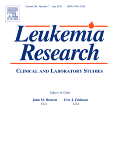
LEUKEMIA RESEARCH
Transforming insights into impactful clinical applications.Leukemia Research is a prominent academic journal dedicated to advancing the field of hematology and oncology, focusing on the latest research developments related to leukemia and other hematological disorders. Founded in 1977 and published by Pergamon-Elsevier Science Ltd in the United Kingdom, this esteemed journal has established itself as a vital resource for researchers and clinicians alike. With an impressive impact factor and categorized in the top quartiles of Cancer Research and Hematology, it provides a platform for high-quality research articles, reviews, and clinical studies that contribute to a deeper understanding of leukemia's complexities. Although not an Open Access journal, Leukemia Research ensures widespread dissemination of knowledge crucial for developing innovative treatment strategies and improving patient outcomes. Researchers, professionals, and students in the fields of hematology and oncology will find this journal an invaluable asset in staying at the forefront of leukemia research, as it prepares to expand its impact through converged years of publication extending into 2024.

Blood and Lymphatic Cancer-Targets and Therapy
Pioneering Insights into Blood and Lymphatic CancerBlood and Lymphatic Cancer-Targets and Therapy, published by DOVE MEDICAL PRESS LTD, is a vital open-access journal that has been disseminating crucial research and findings in the field of hematology and oncology since 2011. With its ISSN 1179-9889, this journal focuses on the latest therapeutic targets and innovative treatment strategies for blood and lymphatic cancers, contributing significantly to the advancement of knowledge and practice in this specialized area. Designed for researchers, healthcare professionals, and students alike, Blood and Lymphatic Cancer-Targets and Therapy aims to foster a deeper understanding of cancer biology and promote collaborative efforts leading to novel therapeutic interventions. The open-access model ensures that research findings are readily accessible to a global audience, underscoring the journal's commitment to enhancing patient care and fostering educational growth in the cancer domain.
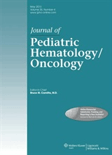
JOURNAL OF PEDIATRIC HEMATOLOGY ONCOLOGY
Transforming lives with cutting-edge insights in pediatric oncology.JOURNAL OF PEDIATRIC HEMATOLOGY ONCOLOGY, published by Lippincott Williams & Wilkins, serves as a vital platform for the dissemination of cutting-edge research and insights in the fields of pediatric hematology and oncology. Since its inception in 1979, the journal has maintained a commitment to advancing knowledge through peer-reviewed articles that contribute to the understanding and treatment of blood disorders and cancers in children. With an impact factor reflective of its academic contributions, the journal is positioned in the Q3 quartile across key medical categories — Hematology, Oncology, and Pediatrics, Perinatology and Child Health — indicating its relevance and influence in the field. While it does not currently offer open access options, the journal remains a crucial resource for researchers, clinicians, and students dedicated to improving pediatric care and outcomes. Researchers are encouraged to contribute to this esteemed journal as it seeks to bridge the gap between clinical practice and research, fostering innovation and improved quality of life for young patients affected by hematologic and oncologic conditions.
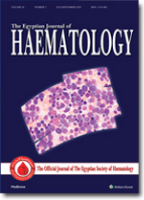
Egyptian Journal of Haematology
Elevating Expertise in Blood Disorders and Transfusion MedicineThe Egyptian Journal of Haematology, published by WOLTERS KLUWER MEDKNOW PUBLICATIONS, stands as a pivotal resource in the field of hematology, particularly within the context of Egypt and the broader Middle Eastern region. This journal is dedicated to disseminating high-quality research that explores the latest advancements in blood disorders, hematologic malignancies, and transfusion medicine. With a focus on original research, case studies, and reviews, it aims to provide a comprehensive platform for hematologists, researchers, and healthcare professionals to enhance their understanding and management of hematological conditions. Although it is not an open-access journal, the rigorous peer-review process ensures that only the most impactful studies are published, contributing to the journal's reputation in the academic community. The Egyptian Journal of Haematology serves as an essential tool for advancing knowledge, improving clinical outcomes, and fostering collaboration among experts in the field.

HemaSphere
Elevating hematology with high-impact findings.HemaSphere, published by WILEY, stands at the forefront of hematology research, offering a vital platform for the dissemination of cutting-edge findings in the field. Since its inception in 2017 and official transition to Open Access in 2018, the journal has positioned itself as a leading conduit for high-impact research, maintaining a prestigious Q1 quartile ranking in the Hematology category as of 2023. Addressed in the United States at 111 River St, Hoboken, NJ, HemaSphere aims to foster a global dialogue among researchers, clinicians, and students by providing unrestricted access to high-quality content that encompasses clinical and experimental advancements. With an array of engaging articles, reviews, and commentaries, HemaSphere contributes significantly to the advancement of hematology, ensuring that critical knowledge is readily accessible to enhance patient care and innovative research. To explore the latest developments and breakthroughs in this dynamic field, we invite scholars, professionals, and students to engage with HemaSphere and elevate their understanding of hematologic science.

Indian Journal of Hematology and Blood Transfusion
Pioneering Research in Hematology for Tomorrow's HealthcareIndian Journal of Hematology and Blood Transfusion, published by SPRINGER INDIA, serves as a leading platform for disseminating original research, reviews, and case studies in the field of hematology. With an ISSN of 0971-4502 and E-ISSN 0974-0449, this journal has been instrumental in advancing knowledge from 2000 to 2024, providing insights into critical issues surrounding blood disorders and transfusion practices. Currently ranked in the Q3 category for Hematology for 2023, it reflects a commitment to high-quality scientific content amidst a competitive landscape where it ranks 97/137 in Scopus for Medicine - Hematology, placing it in the 29th percentile of its peers. The journal primarily addresses a diverse readership, including researchers, healthcare professionals, and students, aiming to foster innovation and collaboration within the field. Although it operates under a subscription model, access options for individual articles and institutional subscriptions ensure that valuable research is disseminated widely to enhance medical practice and education in hematology.